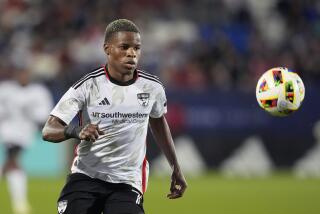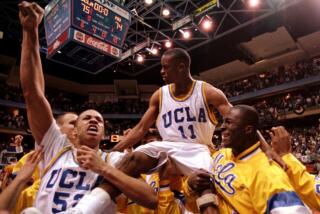GAME OF LIFE : Basketball in the U. S. Gives Turkish Student Chance at Bright Future
- Share via
An 11-year-old Turkish boy plays with his homing pigeons on the roof of his Istanbul apartment building. He holds them gently, feeling their softness. Releasing them, he lies on his back and watches them become specks. After a few minutes, a bird returns. One by one, over a period of a few hours, they all flutter back to the coop. The boy locks them in and says good night.
Two years go by. With the boy spending all of his idle time with the birds, his grades go to the dogs. Ultimately, his parents get angry, sell the pigeons and tell him to take up a sport that doesn’t involve animals and isn’t played on a roof.
Although the boy doesn’t know basketball--he knew a lot of birds, none named Larry--he joins an Istanbul club team and finds out there is more to life than pigeons. Replacing fowl with foul in his vocabulary, he becomes a basketball fanatic and, ironically, flies the coop.
Today, the boy is 18 and lives in Oxnard, thousands of miles from his family. Manuk Kayaoglu came to this country in 1989 to attend high school and play basketball, not necessarily in that order.
“I love basketball,” he said in halting English.
A senior foreign-exchange student at Rio Mesa High, Kayaoglu (pronounced key-O-lu ) spoke no English when he arrived for his junior year but apparently had no difficulty communicating on the basketball court. Starting at point guard, he averaged nearly 11 points last season. Through 14 games this season he is averaging 13.0 points and five rebounds.
“Fundamentally, he’s pretty sound,” Rio Mesa Coach Steve Wolf said.
Kayaoglu learned to play basketball on youth development teams for Galatasaray, one of the biggest and richest clubs in Turkey. Turkish culture might be Middle Eastern, but its basketball is definitely European, and players on club teams can make a decent wage, Kayaoglu said.
“Basketball was not that popular in high school,” he said, “and our college basketball is equal to high school basketball here. The thing to do is play on a club team, which travels all over Europe.”
By the time he was 15, Kayaoglu was an avid fan of the National Basketball Assn. and read dogeared copies of “Basket,” a slick basketball magazine written in Turkish. While playing for his club team, Kayaoglu came to the attention of Jack Avina, a former University of Portland head coach who is coaching in Europe. Avina saw the 6-foot-2 Kayaoglu playing one day and suggested that he come to the United States.
The notion of leaving his family and coming to a strange land was not unrealistic to Kayaoglu or his parents. His father, who sold automobile parts, and his mother, a housewife, knew that their son and daughter had limited opportunities in Turkey as members of the country’s Armenian underclass.
But basketball was a way out.
“The reason they wanted me to play basketball instead of soccer was that basketball players go to college,” Kayaoglu said. “And good American college players can make a very good living playing basketball in Turkey.”
Becoming an exchange student was not difficult. In the summer of ‘89, Kayaoglu placed a call to Ahmet Baras, a friend from Istanbul who was an exchange student at Rio Mesa. Eventually, he got into the Share Program and found a home with an Oxnard family, Robert and Georgia Gillian, who have six children, five living at home. Kayaoglu received an immediate dose of American culture.
“It’s totally different from Turkey’s,” he said. “Americans have so much freedom.”
Kayaoglu particularly enjoyed the freedom to choose his school attire at Rio Mesa instead of having to wear a tie and jacket to school, as he did in Turkey.
Under the conditions of the exchange program, Kayaoglu was supposed to stay in the United States for only one school year, but he wanted to complete high school here and play basketball at an American college. Last April, Kayaoglu approached Rio Mesa assistant principal Tom Ragan and asked for help in getting his visa renewed.
“We went through the whole bureaucracy of the federal government until we finally found the one lady who knew what to do,” Ragan said.
Kayaoglu needed to obtain a U. S. government form and return to Turkey to process the paper work. He went home for five weeks last summer and was able to get a renewable four-year student visa. Back in Oxnard, he stayed with Ragan and Ragan’s two grown sons. It was intended to be a short stay, only until Kayaoglu moved in with a basketball player’s family. But the arrangement worked so well that Kayaoglu is staying with the Ragans indefinitely.
“Manuk is very neat and meticulous,” Ragan said. “He’s also very unique. He plays Chopin as well as rap and rock.”
Kayaoglu’s dreams hinge, of course, on his basketball ability. His coach gives him high marks for quickness, ballhandling and jumping, but Kayaoglu has had problems adjusting to American team-oriented basketball as opposed to the Europeans’ one-on-one, go-to-the-hoop style.
“If he can really pick up the team concept, he’s definitely a college prospect,” said Wolf, who nevertheless doubts that Kayaoglu is ready for Division I.
For his part, Kayaoglu said that “American basketball is so different from European. It’s stronger, faster and more physical.”
Kayaoglu, who will visit Turkey this summer, speaks to his family about every 10 days and sends letters home. His old friends, however, are drifting away.
“I miss them,” he said.
His junior year was tough because he lacked friends and did not have the language skills to make any. But this year, his English has improved--thanks in part to Ragan, a former English teacher--and so has his social life. Kayaoglu now has friends, a girlfriend, a driver’s license and a car.
The day after New Year’s, he became even more popular when he hit two free throws with three seconds to play as the Spartans upset Santa Barbara, 62-60.
“I was really nervous before these free throws, but I didn’t want to show any feelings,” he said. “But I concentrated real hard and they went in. I was so happy.”


